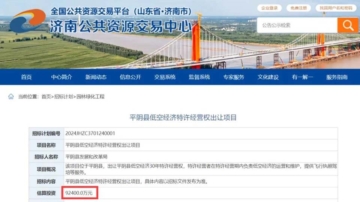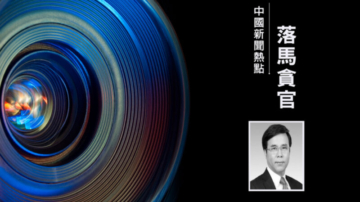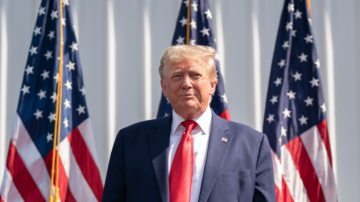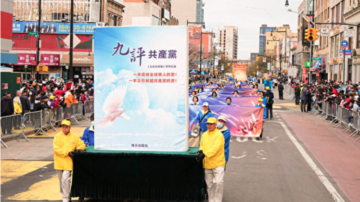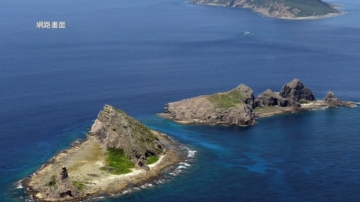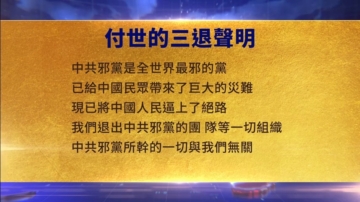【新唐人2014年03月27日讯】美国第一夫人米歇尔•欧巴马26号即将结束对中国的访问。她一如既往的将教育作为出访的重点。25号,她在四川成都发表演讲时强调:人人平等、公民权利以及宗教自由等中共所谓的敏感话题。米歇尔访华的最后一天,她还去了成都一家藏族餐馆用餐。评论指出,米歇尔是一个有信仰、有原则的人,她最明白中国人民最需要甚么。
3月26号,米歇尔•欧巴马访华的最后一天,她和她的母亲以及女儿一起,去到四川成都市的一家藏族餐馆用餐。被中国网民视为“含有政治色彩”。
四川与西藏自治区都有少数民族藏族居住。根据藏族名作家唯色的统计,2009年至今,已有133位藏人以自焚的方式,抗议中共当局压制藏族的宗教和文化。
原国务院农村发展研究中心研究员姚监复:“欧巴马在白宫见了达赖,所以她这次有点相呼应,但是她不直接去访问西藏,所以她跟西藏人接触我觉得有好处,她是夫人,我想她能够促进民间的友谊,促进人民之间的互相了解。”
3月25号上午,米歇尔•欧巴马在“成都第七中学”礼堂,向488名高一、高二学生,以及113位老师发表讲话。
她说:“在美国,无论你住在哪里,你是甚么种族,宗教信仰,或民族,只要你努力工作,相信自己,那么你就有机会取得成功。”
她还补充说,我们也相信每个人都是平等的,我们都有权利自由的表达我们的思想,我们有选择宗教信仰的权利。
作为第一位非洲裔美国籍的总统夫人,米歇尔表示,她和丈夫欧巴马总统是美国“民权运动”的受益者。因为20世纪60年代在美国,掀起了对种族隔离运动的谴责,并呼吁种族平等,人们举行和平抗议集会和游行,要求政府官员更改不平等法律,虽然过程缓慢但可以肯定,最后美国政府改变了。
米歇尔表示,“我们已经摆脱那些不公正的法律。50年后的今天,我丈夫成为美国总统。”
米歇尔的演讲触及中共的敏感问题,在中国,民众的抗议被视为非法。宗教信仰也受到当局的打压和迫害
原《河北人民广播电台》编辑朱欣欣:“说明了欧巴马伕人她是一个有信仰的人、有原则的人,她看到中国的一些现象,听到的一些新闻,她觉得中国人民最需要听甚么样的话,她现在是代表美国人民来访问中国,她首先要面对的是中国人民,而不仅仅是中共这个当权者。”
原《河北人民广播电台》编辑朱欣欣表示,欧巴马伕人米歇尔的中国之行,被称为“教育和文化交流之旅”,她的一番言论,说出了中国人民的心声。
朱欣欣:“我们不仅仅需要物质财富,更需要我们全面的人权,因为物质财富的不公、分配的不均,贫富的差别,就在于我们的人权是不完整的,我们政治权利的缺失,就会导致我们经济权利的缺失,欧巴马伕人可以说是对我们中国很了解。”
米歇尔访问中国的第二天,也就是22号,她在“北京大学”演讲时,也谈到言论自由和普世权利。她说,只有当一个国家倾听她的国民意见和声音时,这个国家才会更强大。
23号,米歇尔在北京的美国大使馆主持教育研讨会,她呼吁应该重视教育和普及教育。她说,如果不是她的父母在她的教育方面进行投资,她就不会取得今天的成就。
原“国务院农村发展研究中心”研究员姚监复指出,中国也应该逐步的推进民主、自由、人权,因为这都是历史发展的必然趋势。他认为米歇尔的谈话会给中国人带来一些启发和联想。
米歇尔24号还到西安参观兵马俑,当天特警暴力清场,一名导游因走得慢,被特警一脚踢得昏死过去。
四川维权组织“六四天网”负责人黄琦说,米歇尔25号访问成都时,当地访民想去米歇尔下榻的酒店附近一睹米歇尔的风采,结果多人被警方拘押、殴打,其中一位访民被打昏送院抢救。
采访编辑/李韵 后制/李勇
Michelle Obama Touches on Sensitive Issues
As the U.S. first lady Michelle Obama's visit in China is
coming to an end on the 26th, education continues to be her
focus.
On the 25th, she stressed sensitive topics in her speech in
Chengdu, Sichuan about equality, civil rights and religious
freedom.
On her last day in China she also visited a Tibetan restaurant in
Chengdu.
Analysts praise Michelle Obama, as a person of belief and
principle, who understands the fundamental need of the Chinese.
On March 26, the last day of the visit, Michelle Obama had lunch
with her mother and her daughters at a Tibetan restaurant in
Chengdu, Sichuan.
The minority Tibetans mainly live in Sichuan and the Tibet
Autonomous Region.
Tibetan writer Woeser indicated that since 2009, 133 Tibetans
have protested by self-immolation against the suppression of
the Tibetan religion and culture by the Communist authorities.
Yao Jianfu, former researcher of Rural Development Research
Center of the State Council: "Mr. Obama met with the Dalai
Lama at the White House, so she echoes that by interacting
with the Tibetans, rather than visiting Tibet.
I think it is good.
As the first lady, she helps to promote friendship and
mutual understanding between peoples."
On March 25 morning, Mrs. Obama talked to the 488 students
and 113 teachers at Chengdu's Number 7 School.
She said that in America, hard-working people can succeed
"no matter where you live or how much your parents have...
or what race, religion, or ethnicity you are."
She also praised America's progress on ethnic equality,
civil rights and religious freedom.
Mrs. Obama said that she and President Obama have benefited
from the rights movement.
The peaceful protests and marches in the 60s called on
government officials to change those laws of discrimination.
Slowly but surely, America changed,
Mrs. Obama said, "Today, 50 years later, my husband and I
are president and first lady of the United States."
Michelle Obama's speech touched the sensitive issue of the
CCP which consider protests as illegal,
and conduct suppression and persecution of religion.
Zhu Xinxin, former editor of Hebei People's Radio: "It tells
you that Mrs. Obama is a person of faith and principle.
She sees things and hears news and learns what the Chinese
need the most.
She visits China on behalf of the Americans.
It is the people she faces the first, not just the CCP authorities."
Former editor of Hebei People's Radio Zhu Xinxin indicates
that Mrs. Obama's trip to China was an exchange of education
and culture, and her speech spoke for the Chinese.
Zhu Xinxin: "We need more than material wealth.
We need even more about human rights.
The cause of the injustice, unevenness and difference in wealth
is exactly due to lack of human rights.
Lack of political rights will lead to the deficiency in our
economic rights.
I would say that Mrs. Obama knows much about China."
Mrs. Obama spoke of universal rights, freedom of speech,
in her speech at Peking University on the 22nd,
"Because time and again, we have seen that countries are
stronger and more prosperous when the voices and opinions
of all their citizens can be heard."
In a discussion about education at the U.S. Embassy in Beijing
on Sunday morning, Mrs. Obama said that she wouldn't be
where she is today without her parents investing and pushing
her to get a good education.
Former researcher of Rural Development Research Center of
the State Council, Yao Jianfu, indicates that China should
gradually promote democracy, freedom, and human rights,
as the inevitable trend of historical development.
He believes Michelle's talks will serve as an inspiration to the
Chinese.
In order to prepare for Michelle Obama's visit to the terra-cotta
warriors in Xi'an on the 24th, special police conducted violent
clearance of the site.
A tour guide fainted from police kicking due to his slow response.
Sichuan activist and also the founder of 64tianwang.com
founder Huang Qi says that local petitioners went to get a
closer look at Mrs. Obama at the Chengdu hotel but met arrest
and beating by the police.
A petitioner lost consciousness from the beating and was
rushed to the emergency room.
Interview & Edit/Li Yun Post-Production/Li Yong
3月26号,米歇尔•欧巴马访华的最后一天,她和她的母亲以及女儿一起,去到四川成都市的一家藏族餐馆用餐。被中国网民视为“含有政治色彩”。
四川与西藏自治区都有少数民族藏族居住。根据藏族名作家唯色的统计,2009年至今,已有133位藏人以自焚的方式,抗议中共当局压制藏族的宗教和文化。
原国务院农村发展研究中心研究员姚监复:“欧巴马在白宫见了达赖,所以她这次有点相呼应,但是她不直接去访问西藏,所以她跟西藏人接触我觉得有好处,她是夫人,我想她能够促进民间的友谊,促进人民之间的互相了解。”
3月25号上午,米歇尔•欧巴马在“成都第七中学”礼堂,向488名高一、高二学生,以及113位老师发表讲话。
她说:“在美国,无论你住在哪里,你是甚么种族,宗教信仰,或民族,只要你努力工作,相信自己,那么你就有机会取得成功。”
她还补充说,我们也相信每个人都是平等的,我们都有权利自由的表达我们的思想,我们有选择宗教信仰的权利。
作为第一位非洲裔美国籍的总统夫人,米歇尔表示,她和丈夫欧巴马总统是美国“民权运动”的受益者。因为20世纪60年代在美国,掀起了对种族隔离运动的谴责,并呼吁种族平等,人们举行和平抗议集会和游行,要求政府官员更改不平等法律,虽然过程缓慢但可以肯定,最后美国政府改变了。
米歇尔表示,“我们已经摆脱那些不公正的法律。50年后的今天,我丈夫成为美国总统。”
米歇尔的演讲触及中共的敏感问题,在中国,民众的抗议被视为非法。宗教信仰也受到当局的打压和迫害
原《河北人民广播电台》编辑朱欣欣:“说明了欧巴马伕人她是一个有信仰的人、有原则的人,她看到中国的一些现象,听到的一些新闻,她觉得中国人民最需要听甚么样的话,她现在是代表美国人民来访问中国,她首先要面对的是中国人民,而不仅仅是中共这个当权者。”
原《河北人民广播电台》编辑朱欣欣表示,欧巴马伕人米歇尔的中国之行,被称为“教育和文化交流之旅”,她的一番言论,说出了中国人民的心声。
朱欣欣:“我们不仅仅需要物质财富,更需要我们全面的人权,因为物质财富的不公、分配的不均,贫富的差别,就在于我们的人权是不完整的,我们政治权利的缺失,就会导致我们经济权利的缺失,欧巴马伕人可以说是对我们中国很了解。”
米歇尔访问中国的第二天,也就是22号,她在“北京大学”演讲时,也谈到言论自由和普世权利。她说,只有当一个国家倾听她的国民意见和声音时,这个国家才会更强大。
23号,米歇尔在北京的美国大使馆主持教育研讨会,她呼吁应该重视教育和普及教育。她说,如果不是她的父母在她的教育方面进行投资,她就不会取得今天的成就。
原“国务院农村发展研究中心”研究员姚监复指出,中国也应该逐步的推进民主、自由、人权,因为这都是历史发展的必然趋势。他认为米歇尔的谈话会给中国人带来一些启发和联想。
米歇尔24号还到西安参观兵马俑,当天特警暴力清场,一名导游因走得慢,被特警一脚踢得昏死过去。
四川维权组织“六四天网”负责人黄琦说,米歇尔25号访问成都时,当地访民想去米歇尔下榻的酒店附近一睹米歇尔的风采,结果多人被警方拘押、殴打,其中一位访民被打昏送院抢救。
采访编辑/李韵 后制/李勇
Michelle Obama Touches on Sensitive Issues
As the U.S. first lady Michelle Obama's visit in China is
coming to an end on the 26th, education continues to be her
focus.
On the 25th, she stressed sensitive topics in her speech in
Chengdu, Sichuan about equality, civil rights and religious
freedom.
On her last day in China she also visited a Tibetan restaurant in
Chengdu.
Analysts praise Michelle Obama, as a person of belief and
principle, who understands the fundamental need of the Chinese.
On March 26, the last day of the visit, Michelle Obama had lunch
with her mother and her daughters at a Tibetan restaurant in
Chengdu, Sichuan.
The minority Tibetans mainly live in Sichuan and the Tibet
Autonomous Region.
Tibetan writer Woeser indicated that since 2009, 133 Tibetans
have protested by self-immolation against the suppression of
the Tibetan religion and culture by the Communist authorities.
Yao Jianfu, former researcher of Rural Development Research
Center of the State Council: "Mr. Obama met with the Dalai
Lama at the White House, so she echoes that by interacting
with the Tibetans, rather than visiting Tibet.
I think it is good.
As the first lady, she helps to promote friendship and
mutual understanding between peoples."
On March 25 morning, Mrs. Obama talked to the 488 students
and 113 teachers at Chengdu's Number 7 School.
She said that in America, hard-working people can succeed
"no matter where you live or how much your parents have...
or what race, religion, or ethnicity you are."
She also praised America's progress on ethnic equality,
civil rights and religious freedom.
Mrs. Obama said that she and President Obama have benefited
from the rights movement.
The peaceful protests and marches in the 60s called on
government officials to change those laws of discrimination.
Slowly but surely, America changed,
Mrs. Obama said, "Today, 50 years later, my husband and I
are president and first lady of the United States."
Michelle Obama's speech touched the sensitive issue of the
CCP which consider protests as illegal,
and conduct suppression and persecution of religion.
Zhu Xinxin, former editor of Hebei People's Radio: "It tells
you that Mrs. Obama is a person of faith and principle.
She sees things and hears news and learns what the Chinese
need the most.
She visits China on behalf of the Americans.
It is the people she faces the first, not just the CCP authorities."
Former editor of Hebei People's Radio Zhu Xinxin indicates
that Mrs. Obama's trip to China was an exchange of education
and culture, and her speech spoke for the Chinese.
Zhu Xinxin: "We need more than material wealth.
We need even more about human rights.
The cause of the injustice, unevenness and difference in wealth
is exactly due to lack of human rights.
Lack of political rights will lead to the deficiency in our
economic rights.
I would say that Mrs. Obama knows much about China."
Mrs. Obama spoke of universal rights, freedom of speech,
in her speech at Peking University on the 22nd,
"Because time and again, we have seen that countries are
stronger and more prosperous when the voices and opinions
of all their citizens can be heard."
In a discussion about education at the U.S. Embassy in Beijing
on Sunday morning, Mrs. Obama said that she wouldn't be
where she is today without her parents investing and pushing
her to get a good education.
Former researcher of Rural Development Research Center of
the State Council, Yao Jianfu, indicates that China should
gradually promote democracy, freedom, and human rights,
as the inevitable trend of historical development.
He believes Michelle's talks will serve as an inspiration to the
Chinese.
In order to prepare for Michelle Obama's visit to the terra-cotta
warriors in Xi'an on the 24th, special police conducted violent
clearance of the site.
A tour guide fainted from police kicking due to his slow response.
Sichuan activist and also the founder of 64tianwang.com
founder Huang Qi says that local petitioners went to get a
closer look at Mrs. Obama at the Chengdu hotel but met arrest
and beating by the police.
A petitioner lost consciousness from the beating and was
rushed to the emergency room.
Interview & Edit/Li Yun Post-Production/Li Yong

